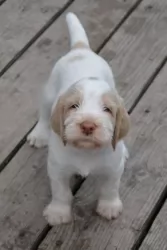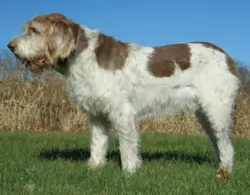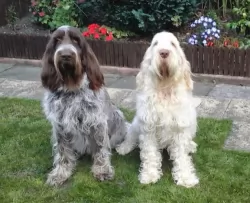 MyDogBreeds
MyDogBreedsSpinone Italiano is originated from Italy but Santal Hound is originated from India. Spinone Italiano may grow 25 cm / 10 inches higher than Santal Hound. Spinone Italiano may weigh 27 kg / 60 pounds more than Santal Hound. Spinone Italiano may live 5 years less than Santal Hound. Spinone Italiano may have more litter size than Santal Hound. Spinone Italiano requires Moderate maintenance. But Santal Hound requires Low maintenance
 This Italian breed has an ancient blood line tracing all the back to 500 BC. Originally bred to hunt, he is today a friendly, alert and loyal companion. He is intelligent enough to do any job you give him. The Spinone is thought to be one of the oldest gun dogs ever, but it is not entirely clear that he came from Italy. There are some who think he may have come from somewhere in these European countries – Italy, Greece, France, Celtic Ireland, Spain or Russia. However, most believe the breed came from Italy in the Piedmont area.
This Italian breed has an ancient blood line tracing all the back to 500 BC. Originally bred to hunt, he is today a friendly, alert and loyal companion. He is intelligent enough to do any job you give him. The Spinone is thought to be one of the oldest gun dogs ever, but it is not entirely clear that he came from Italy. There are some who think he may have come from somewhere in these European countries – Italy, Greece, France, Celtic Ireland, Spain or Russia. However, most believe the breed came from Italy in the Piedmont area.
The most common thinking is that he is a descendent of the Spanish Pointer and/or the Russian Setter. One other theory is that setters from Greece were brought to the Roman Empire and crossed with a variety of Italian dog to make the coarse haired Spinone we see today. Then the French put in their claim that the breed is a cross of many French pointers.
The theory that counts might just belong to the Italians who believe the ancestor to the Spinone includes the German Wirehaired Pointer, the Pudelpointer and the Wirehaired Pointer. It was not until the 19th century that the name Spinone was officially given to the breed.
Before that it might have been known as a Spinoso and named after a thorn bus in Italy called the Spino. This bush was so thick and sharp that small prey animals learned to hide under it because the predators could not get through it. The Spinone however was able to fight through the briars with its thick, coarse hair and tough skin.
The breed almost became extinct during the second world war as before and after the hunters in Italy had started to use other breeds for hunting. Breeders also began to cross the Spinone with wire hairs like German Wirehaired Pointer, the Wirehaired Pointing Griffon and the Boulet.
The most popular hunting dog in Italy today is the Bracco Italiano while the Spinone is still used for hunting.
The Santal Hound has always been used for hunting and these Indian pariah dogs haven’t changed much over the years.
It is a small red Indian indigenous dog. It is named after the Santal tribe who used the dog for hunting. They sometimes refer to the dog as Seuta and Kukur.
When you do research on the Santal Hound, you will mostly find it among indigenous peoples. It isn’t only found in India but in Africa, being found among the different nomadic hunting tribes in East Africa.
 The breed is made up of strong, solid and muscled dogs that have an almost square build. His legs are made to travel any terrain and his head is long with an occipital that is pronounced and unique to the Spinone. They are said to have “human appearing eyes”, with a docked tail in countries allowing it and webbed paws.
The breed is made up of strong, solid and muscled dogs that have an almost square build. His legs are made to travel any terrain and his head is long with an occipital that is pronounced and unique to the Spinone. They are said to have “human appearing eyes”, with a docked tail in countries allowing it and webbed paws.
Shorter hair covers their feet, head, legs, muzzle and ears. They have longer hair on their eyebrows and it is stiff, with soft hair on the muzzle and cheeks with a beard and mustache. It is a single coated dog though the coat is rough. They should have skin, lips, nose, and pads in colors that coordinate with their coats. For white dog it is a red-orange color, brown in dogs that are roan colored and dark red-orange in the orange and white colored dog.
The Santal is considered a small to medium sized dog standing at between 40 and 45cm in height and weighing between 9 and 12 kilograms.
It is also slightly built with fine bones. The coat of the dog is reddish brown or yellow-brown, the eyes are almond shaped and brown and the muzzle is pointed. The ears of the dog are erect and point forward. The tail of this dog is usually curled over the dog’s back. The dog doesn’t really bark as such but howls instead. It has small paws and walks with a high-stepping style like a prancing horse.
These dogs are calm, independent, loving and loyal and also affectionate with their human family. He is cool with strangers.
They are alert, intelligent dogs and you certainly won’t have any trouble teaching him a few simple commands. He cleans himself like a cat. He seems to understand what you say as he always cocks his head to one side when you talk to him. He is a playful dog and will love to be involved with games with the children.
He can also get on well with other dogs in the family. He is capable of adapting to life in the city or the countryside just so long as his exercise needs are met.
 3.Adaptability – Young dogs need a lot of attention but they don’t need a lot of space. The young dogs are energetic while the adult dogs are laid-back. They need exercise every day and at least a small back yard.
3.Adaptability – Young dogs need a lot of attention but they don’t need a lot of space. The young dogs are energetic while the adult dogs are laid-back. They need exercise every day and at least a small back yard.
The Santal dog is an unusual dog with some unique characteristics. He hasn’t got any particularly exceptional characteristics either, but he promises to make you a good pet.
He is capable of providing you with lots of love, and on top of that he is a low maintenance dog too.
When you bring him into your home, you’re going to get yourself a loyal, loving pet and companion.
 This is an ancient breed with not a lot of documented genetic issues, but it does have one deadly condition.
This is an ancient breed with not a lot of documented genetic issues, but it does have one deadly condition.
• Cerebellar ataxia (CA) is inherited and hits the puppies. Because it is a recessive gene both the mother and father must carry it for the puppy to inherit it. This makes it less likely than it would be otherwise. Puppies with the condition do not live more than a year. Since it is a genetic problem there is now a test for it that identifies carriers at a 95% accuracy rate.
• Like many other large breed dogs, they are susceptible to hip dysplasia. This can cause arthritis and/or lameness. There are now hip replacement surgeries available for this condition.
• Bloat is again common in large dogs and you need to watch for it with the Spinone. It can be deadly if not treated immediately. Let your dog rest quietly after eating. Do not let her exercise or play energetically after eating.
Dogs stand a better chance of avoiding sickness if they are fed well and they get a fair amount of exercise. But our fur kids can get sick anytime really, and it pays to know about some of the dangerous diseases they can succumb to -
Your dog will have a fever, he will be lethargic and have diarrhea with vomiting. It is a contagious virus affecting dogs that come into contact with the feces of an ill dog. It attacks a dog’s internal organs, and although the vet will do everything possible to help your dog, parvo is often fatal.
Your dog will be coughing, have respiratory problems, lethargy and weight loss. These parasites are found in your dog’s heart and are spread by mosquitoes. Check with your vet about treatments to prevent this horrible illness.
Have your pet vaccinated against rabies, a deadly diseases spread by saliva and a bite from an infected animal. It is fatal and once your dog has this disease, there is no treatment.
 1Feeding the puppy – feed a high quality dog food for puppies of large breeds. Feed 3-4x day but don’t overfeed or let him exercise after eating even as a puppy.
1Feeding the puppy – feed a high quality dog food for puppies of large breeds. Feed 3-4x day but don’t overfeed or let him exercise after eating even as a puppy.
2.Feeding the adult - feed a high quality dog food for large breeds. Feed 1-2X day but don’t overfeed or let him exercise after eating.
4. Games and Exercises – The Spinone is an active breed, but not a fast dog. In fact, they like to travel at a trot so it becomes a great dog for jogging or running with. They love to jump, track, hunt, hike. They do well with agility, retrieving, flyball, carting, being a therapy dog, a rescue dog and a watchdog.
Provide your Santal Hound with top quality food to ensure his health. While there are some excellent commercially manufactured foods on the market, it is important to choose the high quality ones that have natural, good ingredients in them.
Try to include some home-made food for him which can be simply mixed into the dry kibble twice a week. Boiled chicken, brown rice or pasta and spinach, sweet potatoes and carrots are super tasty and nutritious. Your dog will love such simple, good food as it doesn’t upset his stomach.
If you can, try and include a little bit of raw meat to his diet occasionally as this can go towards ensuring he doesn’t get skin diseases.
Trim your dogs nails, check his eyes and ears for infection and check his teeth too.
Provide your dog with a warm, dry place to sleep.
Don’t allow your Santal Hound to have puppies. There are so many unwanted puppies all over the world. Rather have him or her spayed or neutered to avoid puppies that nobody wants. It is beneficial for his health too.